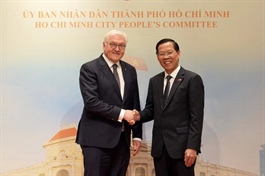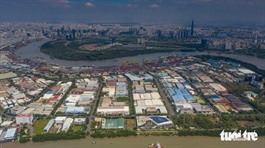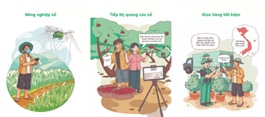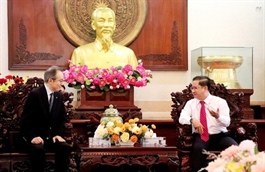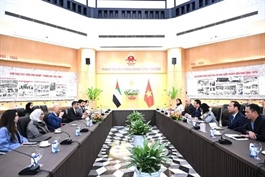Ho Chi Minh City seeks investors for $6.7 billion green projects
Ho Chi Minh City seeks investors for $6.7 billion green projects
Ho Chi Minh City is calling for investments in 28 projects, worth around VND160 trillion (over $6.7 billion), dedicated to green growth objectives. These projects were introduced at a conference on January 24 at Lotte Hotel.

The city is seeking investor participation in six projects focusing on research and development, electronics, semiconductors, high-tech supporting industries, and data centres, with an additional four wastewater treatment plant projects and several initiatives to renovate canals and upgrade or construct new bridges, roads, and apartment buildings.
Phan Van Mai, Chairman of Ho Chi Minh City People’s Committee, emphasised two priority projects, the The Duc city waterlogging management project and the low-carbon programme.
"Waterlogging management is a large and urgent project, fundamental to further expansion," said Mai. The first phase includes three components, a flood information system, a wastewater treatment plant with a capacity of 80,000 cubic meters per day, and 30km of open canals, underground piping, along with several other tasks.
Mai pointed out that Ho Chi Minh City is among the ten cities worldwide that could be most affected by climate change.
Research from the Institute of Environment and Natural Resources from Vietnam National University in Ho Chi Minh City, shows the city emits over 60 million tonnes of CO2 annually, primarily from industrial activities, with nearly 20 million tonnes, transportation, with over 13 million tonnes, with the rest from residential and other activities.
The city also faces challenges from climate change, environmental pollution, resource shortages, and economic difficulties.
Accordingly, the economic hub of the country has chosen green growth as its development strategy, aiming to reduce emissions by 10 per cent by 2030.
Carolyn Turk, World Bank’s Country director for Vietnam, described this goal as, "ambitious, but achievable with the right strategy."
Doan Manh Thang, director of Water and Urban Planning at HaskoningDHV Vietnam, part of the Ho Chi Minh City Planning Consultancy Consortium, revealed the scenario for the city's feasible economic development, targeting an average GDP growth of 8.3 per cent per annum from 2021 to 2030, with a projected population of nearly 12 million by 2030.
"This requires investment estimated at $316 billion by 2030, with 25 per cent from the budget, to develop a green and sustainable economy and society," said Thang, going on to recommend prioritising investments in high-tech industries, financial services, tourism, logistics, and modern retail.
Responding to the call, various international organisations and businesses have expressed interest and contributed ideas and recommendations.
The World Bank estimates Ho Chi Minh City's annual economic losses due to flooding at $250 million, but could rise above $300 million.
"We need to protect the city's economic development by managing flooding effectively," said Carolyn Turk.
Turk also mentioned financial challenges for the green supply chain and upgrading assets to meet energy efficiency and operational performance targets to retain and draw in investors.
The World Bank, working with the city through a joint task force for two years, has committed its support in developing funding sources and a carbon credit market.
The Swiss Cooperation Office in Vietnam and Invest International Netherlands have expressed interest and look forward to closer coordination with local authorities, while the Japan International Cooperation Agency is keen on developing Transit Oriented Development around metro stations.









